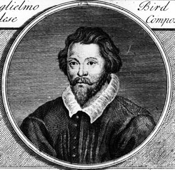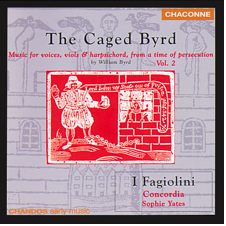The Caged Byrd
Music of William Byrd associated with the persecution of Catholics during the reigns of Elizabeth I and James I
Performers: 6 singers
Programme includes:
Mass for four voices with plainchant propers
Vigilate ergo
Deus venerunt gentes
Ave verum corpus
Peccantem me quotidie
“The Aldeburgh festival was back… Aldeburgh church reverberating with some of Byrd’s rarer motets, Robert Hollingworth leading I Fagiolini in a programme that threw fascinating light on the composer as a daringly subversive Catholic in Protestant Elizabethan England.†The Guardian
“Intelligently designed.†The Times
In an atmosphere of almost civil war proportions, the old Catholic families of England tried to keep the faith during the years of Elizabeth’s reign. William Byrd trod a dangerous path, composing for the new Anglican services but also writing masses. Most strikingly, many of his motets have double meanings, Old Testament texts referring to the suffering of English Catholics. This programme includes his rarely heard masterpiece, Deus venerunt gentes, its text of graphic suffering referring to the martyrdom in 1581 of Jesuit missionary Edmund Campion – a devastating event for the English Catholic community.
Surrounded by the twenty-first century comforts, it’s hard to imagine these times. But this liturgical performance of Byrd’s four-voice Mass is surrounded by the timeless musings of Gregorian chant which the original listeners would have heard as part of the liturgy, allowing our audience to breathe in the mingled atmosphere of faith and fear at the centre of such an illegal celebration in late sixteenth-century England.
“I tell you briefly that, if you do not quickly amend and abandon these evil opinions, you must not in future look upon me as a father, but as a stranger and unknown…†John Tippett to his son, 1585
- I was thinking that. Also @JolyonMaugham was (which carries a little more weight). https://t.co/pAu9emYdGd
- For my birthday I have done admin, walked dog, and rehearsed Walton with @The24choir https://t.co/jNTU2B3UIw https://t.co/LDhso8U9jS
- It's very reasonably priced and all those benefits.... https://t.co/DFJS8e9Dqw


